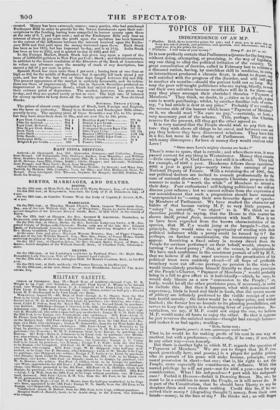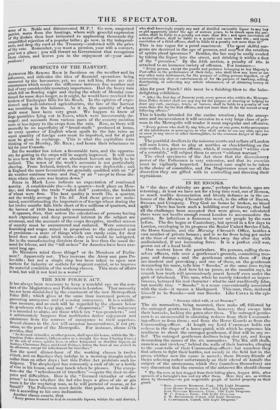TOPICS OF THE DAL
INDEPENDENCE OF AN M.P.
" Mellen. Hold, there is twelve pence for vou ; and I pray you to serve est ,, " I will noire of your moury." keep you out of pawls, smut prabbles, quarrels;e0a 1;1 r.d es; cats II0Fa.s.
rand you, it is the potter for you.
IT is now perfectly certain that Parliament adjourns for the long recess without doing, attempting, or promising, in the way of legislation any one thing to allay the political irritation of the country, The great consultation of doctors, called in February last to trneisterto a diseased nation, having, by matchless skill in medicine, in curing an intermittent produced a chronic fever, is about to depart, ver; well satisfied with the progress of the disorder, and will call again in another six months—should the patient hold out so long. Well may the poor self-taught politicians who are trying, blindly, to work out their own salvation because no others will do it for them—welt may they ,place amongst their cherished theories " Payment of Members." think, no doubt, in politics as in physic, a geed cure is worth purchasing; whilst, by another fiimiliar rule of cam- my, "a bad article is dear at any price." Probably if we could see the reverse side of the banner which bears " Payment of Menabersb on it, we should read " No cure no pay,"—certainly, at least, a very necessary part of the scheme. '1 his, perhaps, the Chartists reserve for the present, till they get the other agreed to. It is very natural that the People should wish to pay their dee. tors : they wish above all things to be cured, and between cure and pay they believe they have discovered relations. They have faith in a fee, but none in the charity of Parliament. They are sick with many distempers ; for love or money they would entreat relief Love !
" Once more Love's mighty charms are broke !"
There's none to spare, that is certain ; and when there was, it never passed current for any thing in Westminster. Money then remains —little enough of it, God knows ; but still it is offered. They talk, for example, of 400/. a year. Handsome fellows these operatives! 4001. a year is good pay—nearly twice the earnings of your National Deputy of France. With a retaining-fee of 4001,, then, our political doctors arc invited to consult professionally for the cure of national disorders : the romantic Chartists propose in this manner to make it " worth the while " of Members to attend to their duty. Poor enthusiasts self-helping politicians! we Will not discuss your scheme ; but we cannot refrain from the expression of our astonishment that such a proposition should bave remained "unresponded to "—using their own favourite figure of speech— by Members of Parliament. We have studied the character and habits of that human variety M. P. to very little purpose, if " salary" is, naturally, " no object" to it. We think we are therefore justified in saying, that the House in this matter has shown itself, print: facie, inconsistent with itself. Was it not to have been expected from the known characteristics of the species, that M. P.s would jump at the bargain ?—that, on principle, they would miss no opportunity of trading with their political influence while a penny could be turned by it ? But perhaps, on further consideration, the inconsistency may dis- appear. Receiving a fixed salary in money direct from the People for services performed on their behalf, would, observe, be turning "an holiest penny ;" that, at the outset, is objectionable. We have such confidence in the consistent pursuit of self' by M. P., that we believe if all the usual avenues to the prostitution of his political trust were suddenly closed—if all hope of profitable treachery were cut off—no peerage, no pension in the vista—he would immediately proclaim himself friendly to that one provision of the People's Charter, " Payment of Members ;" would probably bring in a bill to give effect to it individually—which, be sure, he would duly blazon as it new "concession to the People ;" or, lastly, would let all the other provisions pass, it' necessary, in order to include this. But then it happens, what with possession and expectancy, birds in hand and birds in bush, that the secret sweets of jobbery are infinitely preferred to the visible receipt of a cer- tain lawful annuity : the latter would be a vulgar prize and withal limited; the former has no bounds to its pleasing possibilities, and serves to keep the spirits in a charming fever of expectation. Ne- vertheless, we say, if M. P. could not enjoy the one, we believe M. P. would make all haste to enjoy the other. So that it appears he just reverses the satirical maxim—thought bad enough before— and makes it us bad again ; reading- , "Rem, facies rem ; Si possis, pram'; si non, quocunque modo rem." That is, he would be for making profit of his seat in one way or another, but with a preference,—dishonestly, it' he can ; if not, then in any other way—even honestly. But there is another light in which M. P, regards the question of " Payment of Members.' We arc not to forget that M. P. (we speak generically here, and passim) is a player for public prizes, who in pursuit of his game will stake honour, principle, every moral possession in short—but one ; that is, his right to set the People, more especially his constituents, at defiance. With this sacred privilege he will not part—not for 4001. a year—not for any consideration. What ! his independence ? part with his independ- ence! Forbid it Heaven—forbid it Downing Street. No, Imo; he must be in a condition to scorn the People, or it will never do. It is part of the Constitution, that he should have liberty to say he despises than and owes them nothing. Could this be, if he re- ceived their money ? (degrading thought!)) money, from their own hands—money, ill the face of day ? He thinks not ; so will finger Rone of it. Noble and disinterested M. P. Go now, unspotted patriot, warm from the hustings, where with graceful expression of thy disdain thou hest intimated to applauding thousands thy unqualified rejection of a popular bribe ; go now, in thy independ- ence, and drop thy card at the Treasury—endorsed with the price of thy vote. Remember, you want a pension, your wife a coronet, your son a place : you . thwart no Government that recognizes these claims, and leaves you m the enjoyment of—your inde-
pendence !



























 Previous page
Previous page